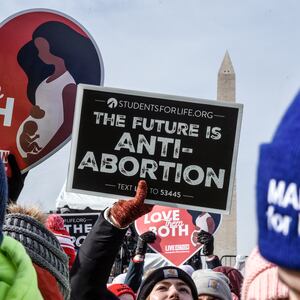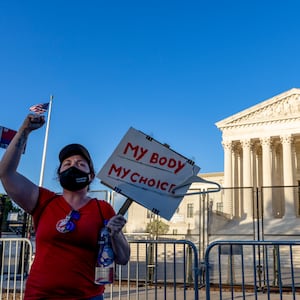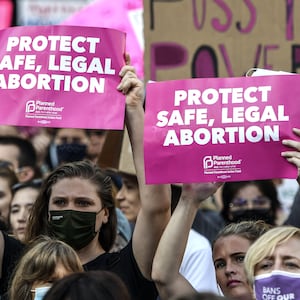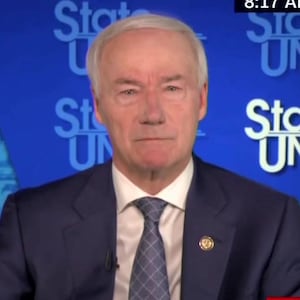When Republican congressional hopefuls in a Colorado swing district met for a debate on May 9, they did so in the middle of a historically explosive moment in American politics.
A week before, Politico reported that a conservative majority on the U.S. Supreme Court had privately voted to overturn Roe v. Wade, the foundation of modern abortion rights.
Although Republicans had been working toward this moment for decades, many of them didn’t want to talk about it. Tim Recihert wasn’t one of them.
Reichert, a leading candidate in Colorado’s 7th District, didn’t just want to talk about abortion on May 9; he wanted to publicly push back on GOP campaign brass for trying to change the subject.
“I want to say something about the way in which the NRCC and political consultants are telling candidates to approach this,” Reichert said, name-checking the National Republican Congressional Committee, the GOP’s official arm for House races. “They’re saying, ‘No, hey, this Dobbs decision? You should kind of skirt this, you should talk about economic issues.’”
A spokesperson for Reichert told The Daily Beast that he meant to refer to the National Republican Senatorial Committee, the party’s official arm for Senate races, which advised its candidates in a May 3 memo to take a moderate tack on the issue.
All the same, Republican campaign leaders have set a clear example for their candidates by deflecting on the issue and attempting to keep a focus on the economy and other issues.
Reichert, an economist with a long history of anti-abortion activism, clearly feels differently. During the debate in the small mountain town of Bailey, he argued this moment presents an “incredible opportunity” for the GOP to explain why their anti-abortion position makes it the “natural home” for women and for “the marginalized, the poor, and the smallest among us.”
“It’s an opportunity to become the party of compassion in a way that we have not been perceived for a long time,” he said. “I am grateful to God for this opportunity.”
Such rhetoric might appeal to Republican primary voters. Whether it will resonate with the broader electorate in this district is less clear. Republicans are aiming to flip this seat long held by retiring Rep. Ed Perlmutter, but Joe Biden carried this district by over 14 points in 2020.
Democrats believe that if Republicans in targeted districts lean in hard to the expected election-year Roe reversal, it will be toxic for the GOP, especially in the suburban districts they’re aiming to win back. If that’s the case, Democrats could get an unexpected break in what is expected to be a brutal midterm election defeat for them.
Jesse Ferguson, a longtime Democratic strategist, argued that the abortion rollback “drives away suburban voters and drives up Democratic turnout—exactly what swing district Republicans can’t afford to have happen.”
Colorado’s 7th District isn’t the only purple district where top GOP recruits have embraced the imminent downfall of abortion rights; at least five other House candidates across the country have, too, through tweets, public statements, and fundraising appeals.
Jeremy Hunt, for instance, is a leading GOP candidate running against Rep. Sanford Bishop in a Democratic-leaning district in southwest Georgia. In a tweet after the draft ruling was leaked, Hunt tweeted that Roe was “egregiously wrong from the start.”
“It is time to heed the Constitution and return the issue of abortion to the people’s elected representatives,” Hunt said. “I’m praying our conservative justices stand for righteousness amidst unprecedented public pressure in the coming weeks.”
In California, Christopher Rodriguez, who’s seeking to run against Rep. Mike Levin (D-CA) in a competitive district near San Diego, went further. In a tweet, Rodriguez promised that if elected, he would “author a bill that will define human life as beginning in the womb and therefore protected by the United States constitution.”
Beyond that, Rodriguez compared the leak of the draft opinion to the Jan. 6 insurrection at the U.S. Capitol. “[If] you think January 6 was a threat to democracy,” he wrote, “undermining the power of the judiciary to expose decisions you don’t like to effective mob threats is far more dangerous than anything we’ve ever seen for the 3rd branch of government.”
The way the Roe news galvanized the GOP base, meanwhile, has compelled some moderate candidates to tack right in order prevail in primaries—even if that positioning could come back to hurt them in November.
Reagan Dunn, a councilmember for King County—home to Seattle and its suburbs—is seeking to run against Rep. Kim Schrier (D-WA), in what handicappers rate as a “toss-up” district. Dunn has typically supported abortion rights, but on May 11, he was the lone councilmember to vote against a resolution affirming abortion rights, the Seattle Times reported. Dunn’s GOP rivals in the 8th District race are all further to the right on the issue than he is.
In response to questions from The Daily Beast, NRCC spokesman Mike Berg said, “We trust candidates to know their districts best.”
“Public and private polling has consistently shown the issues most important to voters are the economy, crime, and border security,” Berg said.
It is clear that Republican campaign leaders are declining opportunities to emphasize the party’s near-uniform support of the court’s expected rollback of abortion rights. In a recent interview with the Washington Post, Rep. Tom Emmer (R-MN), chair of the NRCC, downplayed the role that abortion would play in motivating voters in the 2022 elections.
“Do I suspect [abortion] could affect some voters? Sure,” Emmer said, before arguing that the top issues for swing district voters would be inflation, immigration, and crime.
When the Post asked if Republican candidates would go on the offensive about Democrats’ abortion views, Emmer responded that reporters should ask Democratic candidates what they think.
Meanwhile, the day after the draft leaked, Axios reported that the NRSC, led by Sen. Rick Scott (R-FL), was advising candidates to “be the compassionate, consensus-builder on abortion policy” and to focus on the draft opinion leak, not to reiterate support for an end to legal abortion access.
Public opinion polls conducted in the wake of the draft opinion leak, and well before, have shown that majorities of American voters oppose overturning Roe. A recent PBS/NPR/Marist poll, for instance, found that two-thirds of voters do not want to see that outcome.
Opinion is more divided when it comes to when abortion access should be restricted: that same poll found that voters are evenly split over whether abortion should be legal after 20 weeks of pregnancy.
To the extent Republicans are going on the offensive, it’s against what they argue are Democrats’ unpopular positions on those kinds of restrictions. But doing so could be difficult in districts where the GOP’s own candidates are pushing more partisan positions and rhetoric on the issue.
Reichert, for instance, has not only supported banning abortion but called it a “human sacrifice” in a speech to the Catholic Charities of Denver last year, HuffPost reported in April.
“Every abortion feeds the demonic and thereby contributes directly to the demise of the church, the demise of America and the demise of the West,” Reichert said. “Every single abortion is not just a tragic loss with two victims… It is much more than that—it’s fuel. Fuel for the demonic, because it is the sacrifice of a child at the altar of Baal.”
When contacted by The Daily Beast, Reichert’s campaign echoed GOP leadership’s belief that the 2022 midterms will hinge on economic issues and cited polling showing that very few voters list abortion as a top concern.
“Its no secret that Tim is pro-life as it’s part of his Catholic faith and lived experience. He’s been very transparent about his position,” said campaign spokesperson Audrey Hudson. “This election is about economics and inflation that is crushing the middle class.”
Hudson argued that “the only people who are talking about abortion as a campaign issue” are Reichert’s Democratic rivals.
The Democratic candidate in Colorado’s 7th, Brittany Pettersen, has made abortion rights a focal point, with several of her campaign tweets since May 2 either noting her potential opponents’ views and emphasizing her own stance in favor of abortion rights. In one fundraising tweet, Pettersen identifiers herself as “the pro-choice mom and Democrat running for Congress in CO-07.”
Democratic candidates and lawmakers elsewhere have done the same, emphasizing their support for Roe v. Wade’s protection of abortion access. In response, some formerly vocal abortion opponents in the GOP have conspicuously quieted down on the issue.
Democratic candidates and lawmakers elsewhere have done the same, emphasizing their support for protecting abortion access. In response, some formerly vocal abortion opponents in the GOP have conspicuously quieted down on the issue.
Tom Barrett, the leading candidate running against Rep. Elissa Slotkin (D-MI) in a district Biden won by less than 1 percent, had spent his career as a Michigan state senator leading the charge against abortion access.
In 2019, Barrett introduced legislation that proposed restricting second-trimester abortions with no exception for rape or incest survivors. In fundraising solicitations for his 2022 race, Barrett has described himself as “100% pro life—no exceptions.”
But after the draft opinion was leaked, Barrett’s stance became very circumspect.
“This is certainly an important issue that will motivate people from different ideological sides,” Barrett told a Lansing TV station on May 4. “But I think the overwhelming issues that people are going to be casting their vote on are issues of their daily lives—inflation, gas prices, energy costs, crime.”
Ferguson, the Democratic strategist, called the Roe reversal a classic case of the “dog catching the car” for the GOP.
“Republicans running in 2024 are begging right-wing media to book them on this topic.” he said, “while swing district Republicans in 2022 are trying to change their phone number.”











